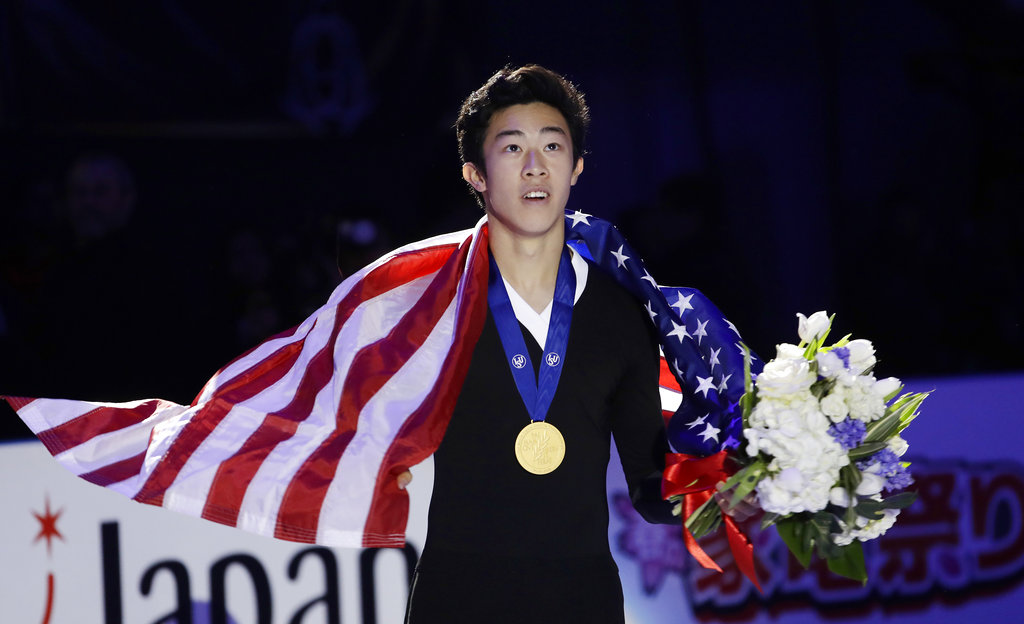Chen avenges his Olympic flop with world figure skate title

United States’ Nathan Chen celebrates after winning a men’s competition at the Figure Skating World Championships in Assago, near Milan, Saturday, March 24, 2018. (AP Photo/Luca Bruno)
ASSAGO, Italy — Nathan Chen’s redemption is complete.
While all of his top competitors fell, the 18-year-old Chen completed six quadruple jumps in the free program on Saturday to become the first U.S. winner of the men’s world figure skating title since 2009.
For the rest, it was a fall-a-thon: 14 sprawls, splats, and tumbles among five competitors as they attempted the all-mighty quad. There were three falls by silver medalist Shoma Uno of Japan, who matched his Olympic silver, and two by Mikhail Kolyada of Russia, who took bronze.
Skating last, Chen said he knew the others made mistakes – though not quite how bad – and that gave him the freedom to attempt six quads, knowing he had room for error.
After his woeful Olympic short program put the podium out of reach, Chen said at the worlds, “I just wanted to redeem myself in the short, and try to maintain what I did in the long.”
He did better than that. He finished first in the short, vanquishing that Olympic ghost.
And then in the free, he completed six quadruples, with minor deductions for stepping out of the quadruple salchow, to score 219.46 in the free for an overall total of 321.40. That compared to his Olympic free program where he attempted six triples, completing five cleanly but putting his hands down on a quad-flip. That earned him an Olympic record 215.08 points.
Chen said the Olympic disappointment in the individual and team short programs helped pave the way to the world title, the first by a U.S. men’s skater since Evan Lysacek nine years ago.
“I learned so much more from making those mistakes in both short programs, than if I would have skated better,” Chen said. “‘Having that experience will propel me in the future better than if I had done the short program better.”
Uno, the only Olympic medalist to show up at the worlds, finished nearly 50 points behind Chen.
Uno stunned the crowd when he fell on an opening quad loop, and circled around for another fall on a quad flip. The final fall came on a quad toe. But with the crowd urging him on, he finished strong with a quad toe in combination and two more combinations as Puccini’s “Turandot” intoned the famed refrain “vincero,” ”I will win.”
“I did not give up,” said Uno, who injured his right foot after the Olympics due to an ill-fitting boot.
Skating to an Elvis Presley medley, Kolyada fell on his opening quad lutz and a quad toe, hitting just one of his quadruple attempts. He showed his disappointment by pointing to his head as he waited for his marks to go up: 185.27 in the free for a total of 272.32.
U.S. skater Vincent Zhou, the world junior champion last year, fell three times in the final skate, tumbling to 14th place after a strong short program put him within striking distance of the podium.
The generally chaotic programs, to some, reflected the long skating season, which started in September, and the pressure of turning around quickly for a major international championship. But the medal winners all said they had enough turnaround time and would compete again in an Olympic-year worlds as long as one was scheduled.
The International Skating Union is considering other rule changes at its next congress in June, which could impact how the skaters plan their programs and the frequency of quads. Proposals include shortening the long program and limiting the number of quads that can be repeated.
In the ice dance final, Olympic silver medalists Gabriella Papadakis and Guillaume Cizeron of France reclaimed the world title they lost last year with an ethereal free dance that earned them a season-best 123.47 points for a total of 207.20.
Though they earned perfect marks for performance, composition, and interpretation, Papadakis said they still had room to improve.
“We won’t be bored. There are also things to improve, competitors to be afraid of. It’s the sport,” Papadakis said.
U.S. champions Madison Hubbell and Zachary Donohue took silver, vindicating a fall in last year’s worlds that kept them off the podium. Canadians Kaitlyn Weaver and Andrew Poje won the bronze.
“I feel like we have done a lot of work tackling our demons, the fear, all the ‘what ifs’ that go through our minds,” Hubbell said. “We have a history of making some errors and giving up our place, so today’s performance, that was our goal: To stay in the moment, to stay connected, and believing what we do is enough.”